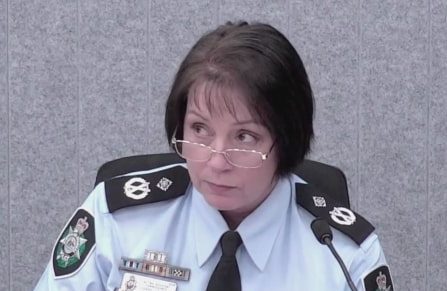
ACTING Assistant Commissioner Joanne Cameron gave evidence to the Sofronoff Inquiry into how the justice system responded to Brittany Higgins’ rape allegations.
Ms Cameron was not directly involved in investigating the former Liberal staffer’s allegations, but the team that was reported to her.
Ms Higgins alleges Bruce Lehrmann, a former colleague, raped her in 2019, inside the Parliament House office of then coalition minister Linda Reynolds after a night out. Mr Lehrmann denies the allegation.
Director of Public Prosecutions Shane Drumgold previously told the inquiry he was concerned about what officers believed were the standard-of-proof tests required to charge someone.
In a statement to the inquiry, Ms Cameron said her understanding of the charging threshold for police officers was “reasonable and probable cause”.
“My understanding of the statutory threshold for a police officer in the ACT… is knowledge or suspicion (in the mind of the police officer) that a person has committed the offence,” she said.
“Practically speaking… a police officer should reach the charging threshold where there exists sufficient evidence to put before the court that, prima facie, the offence was committed by the person as alleged.”
But she said the DPP’s view was that the charging threshold for police was reached on the formation of a “suspicion”.
“Some police were being… confused by the strongly promoted view of the ACT DPP and ODPP that the threshold to charge should focus solely on the word ‘suspected’,” she said.
Ms Cameron said the prosecutor’s view was “liable to distract” police from conducting a thorough investigation to properly assess whether the charging threshold had been met.
In early 2022, Ms Cameron observed members of the prosecutor’s office expressing views to police officers at various levels about the threshold required for charging sexual assault matters.
“It was beyond the DPP/ODPP’s remit of responsibility to be expressing that view to individual police officers,” she said.
“In my opinion it created confusion and placed unnecessary pressure on those police officers (and) it also blurred the lines between the distinct roles of the investigator and prosecutor.”
Police officers have told the inquiry they are confused about the legal test required to charge a suspect.
Ms Cameron said knowing the charges test was an important skill for any police officer to have.
She said the AFP was developing a “more robust framework” to make a clearer distinction between the decision to charge and the decision to prosecute.
Inquiry chair Walter Sofronoff said it was already clear to him that police officers had differing views.
“Something has to be done to create consistency,” he said.
He anticipated he would make a recommendation to the ACT government at the end of the inquiry that work be done within the police force to ensure all officers know what the test is.
Who can be trusted?
In a world of spin and confusion, there’s never been a more important time to support independent journalism in Canberra.
If you trust our work online and want to enforce the power of independent voices, I invite you to make a small contribution.
Every dollar of support is invested back into our journalism to help keep citynews.com.au strong and free.
Thank you,
Ian Meikle, editor









Leave a Reply